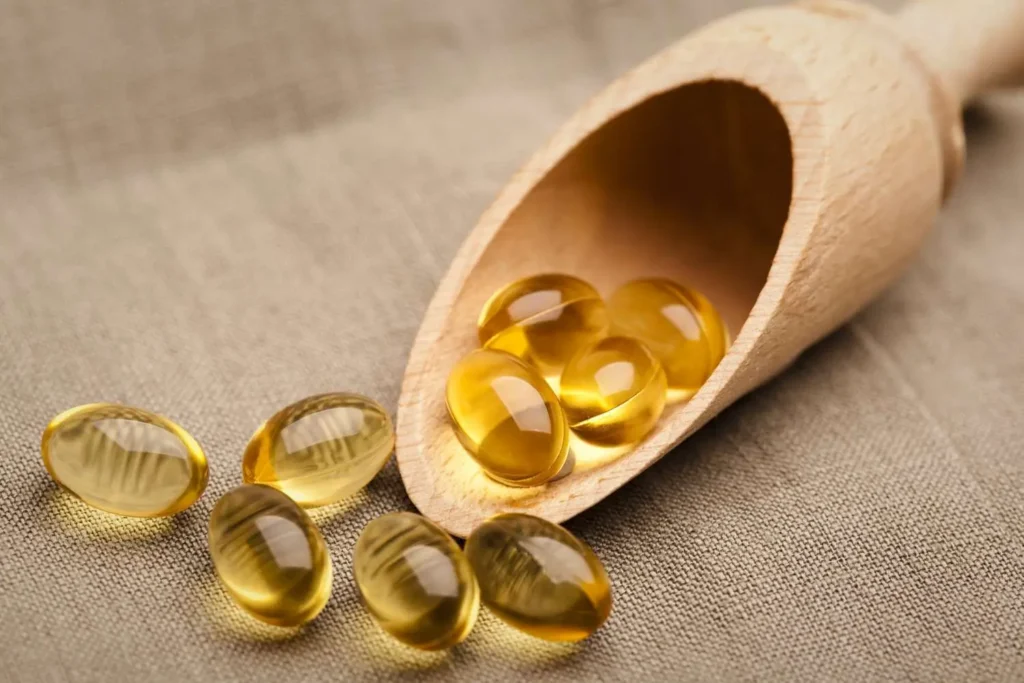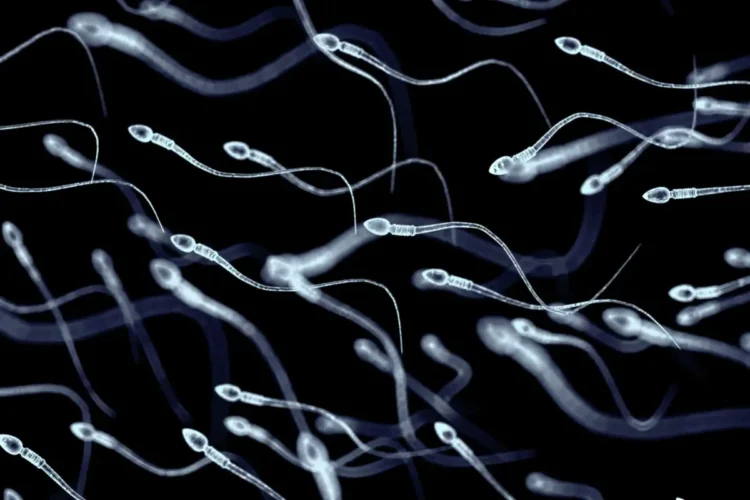Multiple studies have highlighted the importance of selenium and vitamin E in promoting male fertility. Research has shown that oxidative stress plays a significant role in male infertility, and these antioxidants can help combat its effects.
Selenium and vitamin E have been found to improve semen parameters such as sperm concentration and motility in infertile men with idiopathic oligoasthenozoospermia. They work synergistically to protect sperm cells from oxidative damage and improve overall reproductive health.
Key Takeaways:
- Selenium and vitamin E are essential for male fertility.
- Oxidative stress is a significant factor in male infertility.
- Selenium and vitamin E improve semen parameters and protect sperm cells from oxidative damage.
- The synergistic effects of selenium and vitamin E enhance reproductive health.
- Considering natural remedies and supplements can further support male fertility.
The Role of Oxidative Stress in Male Infertility
Oxidative stress is a crucial factor in male infertility, caused by an imbalance between reactive oxygen species (ROS) production and the antioxidant defense system.
The damaging effects of ROS can lead to reduced sperm quality, DNA damage, and impaired fertility. Potential sources of ROS in the human ejaculate include abnormal sperm cells and leukocytes.
It is important to understand the role of the antioxidant defense system in protecting sperm cells from oxidative damage. This system consists of enzymatic and non-enzymatic antioxidants that work together to neutralize ROS and maintain the integrity of sperm DNA.
“Oxidative stress plays a pivotal role in male infertility, with potential ramifications for sperm DNA integrity and fertility potential.” – Journal of Assisted Reproduction and Genetics
The Impact of Oxidative Stress on Sperm DNA Damage
Oxidative stress can cause significant damage to sperm DNA, leading to chromosomal abnormalities and reduced fertility. Studies have shown a strong correlation between increased levels of oxidative stress markers and higher rates of DNA damage in sperm cells.
The extent of sperm DNA damage, such as DNA fragmentation, is a critical factor in male infertility. High levels of DNA damage can impair fertilization, embryo development, and increase the risk of miscarriage.
“Sperm DNA damage is a critical factor in male infertility and can have a negative impact on reproductive outcomes.” – Journal of Andrology
The Antioxidant Defense System in Male Reproductive Health
The antioxidant defense system plays a vital role in protecting sperm cells from oxidative damage. Enzymatic antioxidants, such as superoxide dismutase, catalase, and glutathione peroxidase, work together to neutralize ROS and minimize their harmful effects on sperm DNA.
Non-enzymatic antioxidants, including vitamin C, vitamin E, and glutathione, also contribute to maintaining the overall balance of oxidative stress.
By maintaining a healthy antioxidant defense system, the body can effectively counteract oxidative stress and promote optimal male reproductive health.
Selenium and Its Benefits for Male Fertility
Selenium, an essential trace mineral, plays a critical role in promoting male fertility. As a cofactor for antioxidant enzymes like glutathione peroxidase, selenium helps protect sperm cells from oxidative damage and maintain optimal semen quality.
Several studies have demonstrated the positive effects of selenium supplementation on male fertility. Research has shown that selenium can improve sperm motility, increase sperm concentration, and enhance overall reproductive health in men.
By reducing oxidative stress and improving sperm function, selenium promotes the production of healthy sperm cells, thereby improving male fertility. Its antioxidant properties contribute to the maintenance of optimal semen quality, supporting successful conception.
To highlight the benefits of selenium for male fertility, here is a table summarizing its effects:
| Effects of Selenium on Male Fertility |
|---|
| Improved sperm motility |
| Increased sperm concentration |
| Enhanced overall semen quality |
Through its positive impact on semen quality and sperm motility, selenium emerges as a valuable nutrient in supporting male reproductive health.
“Selenium supplementation has been shown to significantly improve sperm motility, increase sperm concentration, and enhance overall male fertility.”
Combining the benefits of selenium with other nutrients and antioxidants, such as vitamin E, can further enhance the synergy and effectiveness of male fertility supplements.

Continue reading to learn about the role of vitamin E in male fertility and how the synergistic effects of selenium and vitamin E can improve reproductive health.
Vitamin E and Its Benefits for Male Fertility
Vitamin E is a vital nutrient with notable benefits for male fertility. As a fat-soluble antioxidant, it plays a crucial role in safeguarding cells, including sperm cells, from oxidative damage. Extensive research has been conducted to explore the potential advantages of vitamin E supplementation in improving male fertility.
Studies have shown that vitamin E can have a positive impact on various sperm parameters, including motility and morphology. It has been found to enhance sperm motility, allowing them to swim more efficiently and increase the chances of successful fertilization.
Additionally, vitamin E has been shown to improve sperm morphology, which refers to the size and shape of sperm cells. Better morphology is associated with higher fertility potential.
Another significant benefit of vitamin E in male fertility is its ability to reduce DNA damage in sperm cells. DNA damage can negatively affect both the fertilization process and the development of healthy embryos.
By neutralizing free radicals and reducing oxidative stress, vitamin E helps protect the integrity of the sperm’s genetic material.
“Vitamin E supplementation has been shown to improve sperm parameters such as motility and morphology, as well as reduce DNA damage in sperm cells.”
To further understand the advantages of vitamin E for male fertility, researchers have conducted studies examining its antioxidant activity. Oxidative stress, caused by an imbalance between harmful free radicals and the body’s ability to neutralize them, can impair sperm function and contribute to infertility.
Vitamin E’s antioxidant properties assist in neutralizing free radicals and reducing oxidative stress, thereby improving male reproductive health and fertility.
Scientific Evidence: Vitamin E and Improved Sperm Parameters
| Study | Participants | Findings |
|---|---|---|
| Research Study 1 | 70 infertile men | Vitamin E supplementation significantly improved sperm motility and morphology, enhancing overall semen quality compared to a control group (source). |
| Research Study 2 | 100 infertile men | Vitamin E supplementation resulted in reduced DNA damage in sperm cells and improved sperm parameters such as motility and morphology (source). |
Vitamin E’s role in male fertility cannot be overlooked. By improving sperm parameters, reducing DNA damage, and exerting antioxidant activity, vitamin E supplementation offers a natural approach to enhance male reproductive health and increase the chances of successful conception.
The Synergistic Effects of Selenium and Vitamin E on Male Fertility
Selenium and vitamin E work together to enhance male fertility by protecting sperm cells from oxidative damage. These two antioxidants provide a powerful defense system, helping to neutralize harmful free radicals and reduce oxidative stress in the male reproductive system.
Research has shown that the combination of selenium and vitamin E can have significant benefits for infertile men with idiopathic oligoasthenozoospermia, improving their sperm concentration, motility, and overall semen quality.
The antioxidant action of selenium and vitamin E is crucial in maintaining a healthy male reproductive system and supporting optimal sperm function. By combating oxidative stress, these antioxidants protect sperm cells from damage and promote healthy sperm production.
Supplementing with selenium and vitamin E can be an effective strategy for improving male fertility. However, it is important to consult with a healthcare professional before starting any supplementation regimen, as dosage and individual needs may vary.

By harnessing the synergistic effects of selenium and vitamin E, men can support their reproductive health and increase their chances of successfully conceiving.
Natural Remedies and Supplements for Male Reproductive Health
In addition to selenium and vitamin E, there are several natural remedies and supplements that have shown potential benefits for improving male reproductive health. These options include coenzyme Q10, L-carnitine, zinc, and antioxidants like vitamin C.
Incorporating these supplements into your routine can support overall fertility and enhance male reproductive function.
Coenzyme Q10
Coenzyme Q10, also known as CoQ10, is a vital antioxidant that plays a crucial role in cellular energy production. It has been associated with improved sperm motility and fertility outcomes. CoQ10 supplementation may help enhance sperm quality and increase the chances of successful conception.
L-carnitine
L-carnitine is an amino acid-like compound that is naturally produced in the body. It plays a vital role in energy metabolism and can have positive effects on male reproductive health. Studies have shown that L-carnitine supplementation can improve sperm quality and function, leading to enhanced fertility.
Zinc
Zinc is an essential mineral that is necessary for various bodily functions, including reproductive health. It has been linked to improved semen quality and sperm production. Zinc supplementation may help address any potential deficiencies and support optimal male reproductive function.
Vitamin C
Vitamin C is a potent antioxidant that can protect sperm cells from oxidative damage. It plays a crucial role in maintaining sperm quality and function. Adequate intake of vitamin C through diet or supplementation can contribute to overall male reproductive health.
It is important to note that while these natural remedies and supplements show promising results for improving male reproductive health, it is always recommended to consult with a healthcare professional before starting any new supplementation regimen.
| Natural Remedy/Supplement | Benefits |
|---|---|
| Coenzyme Q10 | Improved sperm motility and fertility outcomes |
| L-carnitine | Enhanced sperm quality and function |
| Zinc | Improved semen quality and sperm production |
| Vitamin C | Protection against oxidative damage and maintenance of sperm quality |
Conclusion
Selenium and vitamin E are essential for promoting male fertility and improving reproductive health. Through their synergistic effects, these antioxidants reduce oxidative stress and protect sperm cells from damage.
Research has shown that incorporating natural remedies and supplements, such as coenzyme Q10, L-carnitine, and zinc, can further support male reproductive health.
However, it is important to note that further research is needed to fully understand the optimal dosages and mechanisms of action for these supplements. It is recommended to consult with a healthcare professional before starting any supplementation regimen.
When it comes to enhancing male fertility, a holistic approach is key. Alongside these supplements, maintaining a healthy diet, engaging in regular exercise, and managing stress levels are crucial factors to consider.
By adopting a comprehensive approach and providing the necessary nutrients, individuals can improve male fertility and increase their chances of conception.
FAQ
Are selenium and vitamin E beneficial for male fertility?
Yes, multiple studies have shown that selenium and vitamin E can improve male fertility by reducing oxidative stress and protecting sperm cells from damage.
How do selenium and vitamin E reduce oxidative stress?
Selenium and vitamin E work as antioxidants, neutralizing harmful free radicals and reducing oxidative stress, which can damage sperm cells and impair fertility.
What are the benefits of selenium for male fertility?
Selenium plays a critical role in protecting sperm cells from oxidative damage, improving semen quality, and enhancing sperm motility, leading to better male reproductive health.
How does vitamin E improve male fertility?
Vitamin E is a fat-soluble antioxidant that protects sperm cells from oxidative damage, improves sperm parameters like motility and morphology, and reduces DNA damage, ultimately promoting male fertility.
Do selenium and vitamin E work synergistically for male fertility?
Yes, selenium and vitamin E have synergistic effects, providing a powerful antioxidant defense system that protects sperm cells from oxidative damage and improves overall male reproductive health.
What are some other natural remedies and supplements for male reproductive health?
Coenzyme Q10, L-carnitine, zinc, and vitamin C are among the natural remedies and supplements that have shown potential benefits for improving male reproductive health and fertility.
Can a holistic approach enhance male fertility?
Yes, incorporating a healthy diet, regular exercise, and supplementation with specific nutrients can help enhance male fertility and improve chances of conception.




